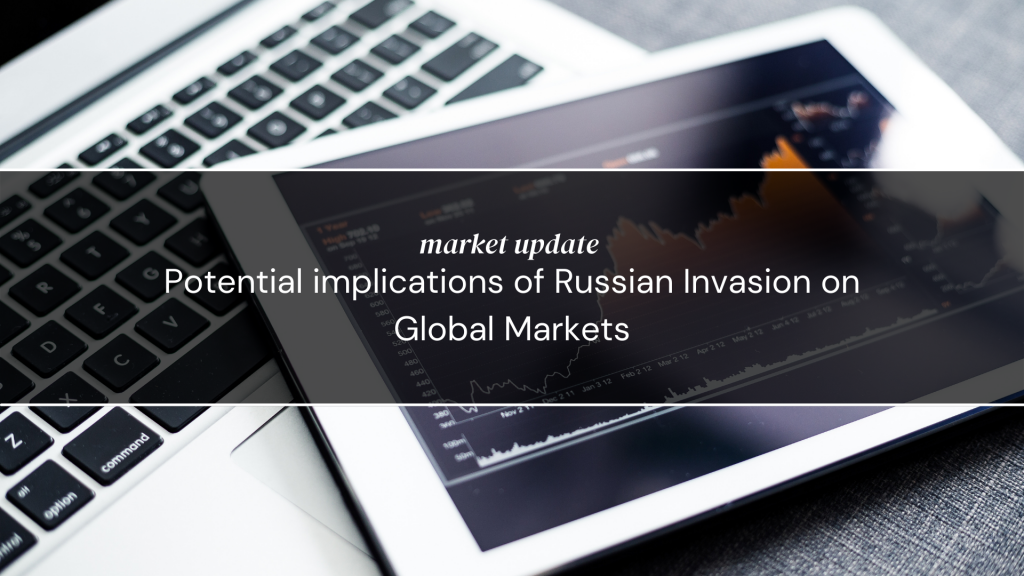Market Update: Potential Implications of Russian Invasion of Ukraine on Global Markets Posted on March 2, 2022

Article by MFS Investment Management
The breakout of a severe geopolitical crisis following Russia’s invasion of Ukraine has significantly increased major uncertainty in global markets. While accurately predicting geopolitics is an impossible task, the purpose of this note is to articulate our views on the potential impact of the crisis on the global macroeconomic backdrop and global markets. Prior to the crisis, investor focus was on inflation dynamics in the face of slowing economic growth and concerns about central bank overtightening. While crisis will reinforce existing concerns, there are potentially other effects that could complicate the macroeconomic backdrop.
From a global macroeconomic standpoint, the geopolitical crisis primarily impacts markets as a supply-side shock. This suggests that supply side bottlenecks, which had been a major challenge since Covid, may persist further, with negative repercussions on the growth outlook. The most significant and immediate impact will be on energy prices due to Europe’s heavy dependence on Russian gas supply. For this reason, along with additional potential supply side effects of sanctions against Russia, the inflation backdrop is expected to worsen in the near term. Inflation has become a major political challenge in many countries, and it is likely that various governments will consider putting measures in place to alleviate the impact on its citizens.
From a monetary policy perspective, the geopolitical crisis is unlikely to generate further central bank hawkishness. We believe central banks may become wary of the growth implications of additional policy moves beyond those that have already been signaled, and therefore do not anticipate the front-end of Treasury curves to price further rate hikes. It will be particularly important to watch how the Fed will address current events at its forthcoming FOMC meeting on March 16.
For global equity markets, we expect top-down effects, with potential sector rotation impact. Given the potential ripple effects of the invasion on growth, it is likely that earnings expectations will be revised downward. Corporate margins are also likely to come under further pressure, assuming supply bottlenecks become more entrenched, and we anticipate longer duration growth sensitive equities may be most impacted. In contrast, defensive sectors, together with energy may be better positioned to weather the shock.
For fixed income markets, a risk-off regime may take over as the result of the crisis. This would likely result in some spread widening, particularly in high-yield and emerging markets, combined with some flattening of the US Treasury curve. A flight to safety suggests that the upward rate normalization, which was well under way in US Treasuries, will likely be on pause. Meanwhile, in traditional risk-off scenarios, the USD typically benefits as a defensive asset, with negative repercussions for higher-beta currencies, including emerging market FX.
What to watch for during these turbulent times. We will pay particular attention to a number of key macro variables as the crisis plays out, starting with oil price, which will be the bearer of bad news if a spike beyond $100 persists. The shape of the US Treasury curve will help inform investor views on growth expectations. Likewise, it will be important to watch whether PMIs will signal a more severe growth slowdown risks in the period ahead. We will also monitor central bank communications, particularly looking for any signals that major central banks start to tone down their hawkish bias. While sanctions have been announced against individuals and financial institutions in Russia, we expect that sanctions will be expanded significantly and will be following their potential impacts on the global economy. Overall, we are not concerned about recession risks, given the strength of the macro-fundamental backdrop, but we also recognize that uncertainty has risen considerably, and with that comes a wider range of potential outcomes.
The views expressed are those of MFS, and are subject to change at any time. These views should not be relied upon as investment advice, as securities recommendations, or as an indication of trading intent on behalf of any MFS investment product.





